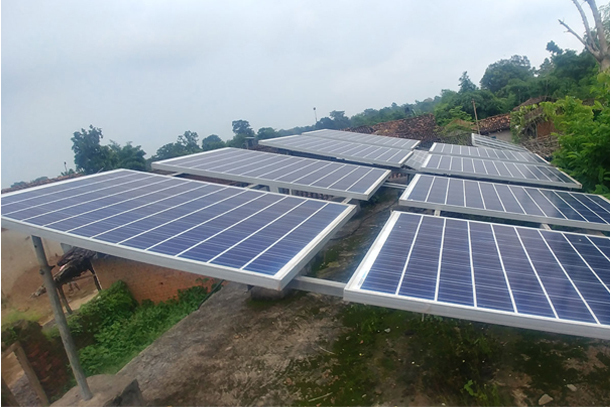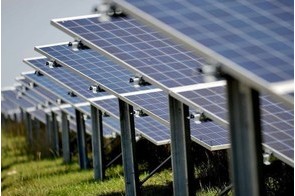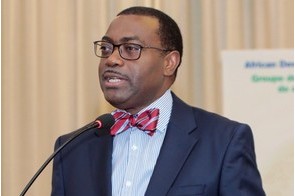Solar mini-grid opportunities for rural electrification in Nigeria

Summary
A study by BloombergNEF (BNEF) shows that Nigeria is the most economically viable market for commercial and industrial (C&I) solar power in sub-Saharan Africa, with 10,713 GWh/year C&I power demanded as of 2015.
Despite decades of attempts at power sector reforms in Nigeria and billions of dollars spent in the process, the country's economic potentials are still being constrained because of lack of access to power. A 2018 World Bank study shows Nigeria as having the world’s second largest deficit in access to electricity, that is, after India. The Bank's Sustainable Energy for All (SE4ALL) database shows only 54.4 per cent of Nigeria’s population had access to electricity in 2017.
In a country where a majority (51 per cent) of the population lives in rural areas, less than 40 per cent of rural dwellers have access to power, compared to 83.6 per cent of the urban population with access. This goes to show how far off the country is from achieving the Sustainable Development Goal 7, which seeks universal access to affordable, reliable, sustainable and modern energy by 2030.
Even the national aspiration to achieve power generation capacity of over 40,000 megawatts (MW) in 2020 has not been realised. According to the Nigerian Electricity System Operator (NESO), the country's current installed capacity is 12,522MW and reached a peak generation of 5,375MW as of February 7, 2019. Transmission capacity stands at 8,100MW. Last month, power generation even fell to 3,757MW.
Perennial problems in power supply include gas supply shortages, limited distribution networks, limited transmission capacity, electricity theft, large metering deficit and high technical and commercial losses. Because of the lack of access, Dalberg Advisors, a global strategic advisory firm, said Nigerian households own and operate an estimated 22 million gasoline/diesel generators, whose combined generating capacity is eight times more than the grid-connected electricity supply. Apart from the huge financial cost of $12 billion spent annually on generators, there is the air and noise pollution the generators constitute, increasing the carbon footprint of the country and posing major health risk to people. Many people have died from carbon dioxide (CO2) poisoning from generators.
Many more, especially women and children, are at risk of dying from using wood and charcoal fuels for cooking in rural communities. Others spend their meagre resources on kerosene and candles for lighting; they pay extra for charging their cell phones. This lack of access to modern energy services has continued to stifle productivity both in rural and urban communities – although productivity losses are more acute in rural areas because of the significant constraints to economic opportunities, especially in agricultural production.
With greater access to electricity, innovation in farming would begin to sprout in different parts of the country as more young people would be engaged in agriculture. Access to power will also increase the application of irrigation in farming, creating all-year-round farming operations. Given the high cost and difficulty of expanding grid electricity to rural areas, the most practical solution to rural electrification that has been identified is a mini-grid system. Also known as micro-grids or island grids, mini-grids can be from solar, hydro, biomass, wind and other energy sources with capacities ranging from 10 kilowatts (kW) to 10MW.
Based on the sustainability objectives of access, affordability and elimination of CO2 emissions, solar mini-grids are the most appropriate means of providing regular, cleaner and cheaper electricity for rural communities in Nigeria. They are amenable to small-scale application and are economically viable. The mini-grid system is also appropriate for developers in terms of being able to better track the communities' energy needs so that electricity supplied can meet the demand.
Solar mini-grids are suitable for lighting and heating purposes in homes as well as running small businesses like grain mills, cocoa-drying operations, carpentry workshops and restaurants, all of which are key economic activities in rural communities. With gasoline generators, most small-scale businesses in Nigeria, especially those in communities without grid access, expend up to 60 per cent of their profits on fuelling and repairing the generators. Solar mini-grids, which are cheaper, clean, efficient and reliable sources of electricity, can reduce recurrent expenditures of businesses in rural areas arising from using petrol generators.
The opportunity in the Nigerian mini-grid sector is no pie in the sky. The sector is steadily growing. A good number of local and foreign-based firms are tapping into the opportunity by committing funds for the development of solar mini-grid projects in communities with limited or without access to grid-connected electricity. One of such firms is Rensource Energy, a Nigerian startup that builds and operates off-grid solar-powered micro-utilities.
Regarded as Nigeria’s fastest-growing provider of off-grid power, the startup provides services to small and medium-scale enterprises (SMEs) by way of a power-as-a-service (PaaS) model. Under a solar PaaS model, electricity is distributed to end-users without the customers owning the generating infrastructure. End-users are simply billed for the wattage of electricity used. In 2019, the startup raised a $20 million Series A round led by CRE Venture Capital and the Omidyar Network.
Other companies in the sector include Azuri Technologies – a British pay-as-you-go solar company – which at different times has partnered with First Bank of Nigeria Limited and Niger Delta Power Holding Company (NDPHC) to launch pay-as-you-go solar systems to under-served rural areas in Nigeria. GVE Projects Limited, a Port-Harcourt-based solar energy company, also says it has a mandate to deploy 524 mini-grids in the country. The company plans to reach four million customers over a six-year period.
Total investment in solar and other renewable and clean power projects that are either under construction or planned around the country by the federal government and private firms is over $20 billion. A study by BloombergNEF (BNEF) shows that Nigeria is the most economically viable market for commercial and industrial (C&I) solar power in sub-Saharan Africa, with 10,713 GWh/year C&I power demanded as of 2015. According to the report, on-site solar power is cheaper than the electricity tariffs paid by C&I clients in seven out of 15 markets in SSA, including Nigeria.
The adoption of mini-grids by farmers, businesses and households in rural areas in Nigeria is both a function of affordability, quicker access as well as environmental and health safety. To encourage an expansion of access for off-grid electricity solution, there must be a genuine effort by the government to give policy backing to solar mini-grid projects in clustered rural settlements.
Such policy backings will include tax breaks and incentives for the solar mini-grid investors, tariff subsidies for the target beneficiaries of the projects and prioritizing electricity generated via solar mini-grids in the advent of future connection to the transmission infrastructure. The Rwandan government actually has a policy target of achieving 48 per cent of off-grid connections by 2023/24. Off-grid connection was at 12 per cent in 2019. Rwanda also has an ambitious target of universal power access by 2023/24.
With proper policy implementations and funding, solar mini-grids can play a huge role in decongesting the overburdened national grid while ultimately moving the country towards the holy grail of universal access to electricity in a not too distant future. Access to adequate financial and institutional support will ensure that solar mini-grid investors are able to offer services at competitive billing to be able to sustain their businesses.
Also, solar mini-grid developers and investors require long-term guarantees and certainty about the country's electrification policies given that it typically takes about seven years or more to recover the investment on such projects. Investors also need prompt and verifiable information on licencing requirements, tariffs, subsidies and other government programmes that can enhance their economic and technical capacities.
Kayode M. Oluwadare, an energy economist and entrepreneur, is the Managing Director and CEO of Green Fort Ltd, an energy project company with core interests in LPG projects, as well as consultancy in natural gas value chain management.
Related
-
Acumen’s impact fund raises $70m to boost clean energy access in Africa
KawiSafi Ventures supports companies that deliver clean, affordable renewable energy to low-income consumers and ...
-
COVID-19 has widened energy accessibility gap, says new GCEEP report
Many Nigerians are among over 100 million people worldwide to see their electricity access disconnected because they ...
-
IFC, DFID partner to boost solar investment in Nigeria
Eme Essien Lore: "The solar market has the potential for quick wins in bringing access to electricity for more businesses ...
Sustainable Development Section Sponsor
Most Popular
- India’s sustainable eating habits offer hope for climate change mitigation
- Unpaid care work prevents 708m women from participating in labour market
- COP29: Multilateral development banks to boost climate finance
- Africa Finance Corporation facilitates $200mn financing for BUA Group
- Access Holdings and African art renaissance









